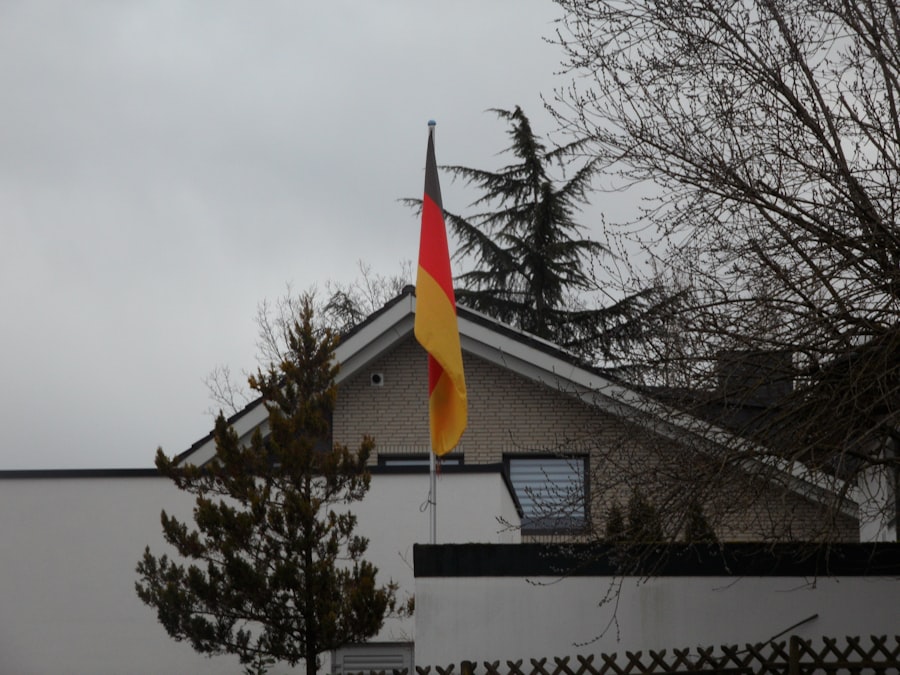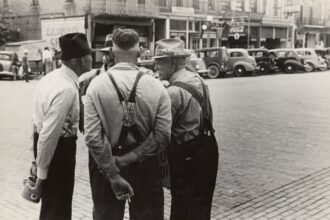In the early 20th century, New York City was a bustling hub of activity, a melting pot of cultures and ideas. However, beneath the surface of this vibrant metropolis lay a dark undercurrent of espionage that would soon come to light. The arrest of a group of German spies in 1917 sent shockwaves through the nation, revealing the extent to which foreign operatives had infiltrated American society.
This shocking revelation not only exposed the vulnerabilities of the United States during World War I but also ignited a wave of paranoia and suspicion among its citizens. The arrests were the culmination of a series of investigations that had been ongoing for months. Authorities had been alerted to suspicious activities linked to German nationals, who were believed to be gathering intelligence and sabotaging American war efforts.
As the details of the arrests emerged, it became clear that these spies had been operating under the radar, blending seamlessly into the fabric of New York life while plotting against the very country that had welcomed them. The implications of their actions were profound, as they underscored the reality that even in a land of freedom and opportunity, threats could lurk in the shadows.
Key Takeaways
- The arrest of German spies in New York was a shocking revelation that exposed the presence of enemy agents on American soil.
- The espionage network operated by German spies in New York was sophisticated and posed a serious threat to national security during World War I.
- The investigation and arrests of the German spy ring uncovered the extent of their activities and the potential damage they could have caused.
- The role of German spies in World War I was a significant threat to national security, leading to fear and distrust within American society.
- The interrogation and confessions of the German spies unraveled the secrets of their operations and provided valuable intelligence for the American government.
The Espionage Network: How German Spies Operated in New York
The espionage network established by German operatives in New York was both sophisticated and insidious. These spies employed a range of tactics to gather intelligence, often relying on seemingly innocuous cover stories to mask their true intentions. Many were skilled at blending into various social circles, using their charm and charisma to gain the trust of influential individuals.
This ability to navigate different environments allowed them to collect valuable information about military operations, industrial production, and transportation routes. Moreover, the network was not limited to a handful of individuals; it was extensive and well-organized. Spies communicated through coded messages and utilized various methods to relay information back to Germany.
They often collaborated with sympathizers within the United States, who unwittingly aided their efforts by providing resources or information. This intricate web of espionage highlighted the challenges faced by American authorities in identifying and dismantling such a covert operation. The spies’ ability to operate in plain sight made it difficult for law enforcement to discern friend from foe, creating an atmosphere of uncertainty and fear.
Uncovering the German Spy Ring: The Investigation and Arrests

The investigation into the German spy ring was a complex endeavor that required the collaboration of multiple agencies, including local law enforcement and federal authorities. As suspicions grew, agents began to piece together evidence that pointed to a coordinated effort by German nationals to undermine American interests. Surveillance operations were initiated, and informants were recruited to gather intelligence on suspected spies.
The process was painstaking, as investigators had to tread carefully to avoid tipping off those under scrutiny. Eventually, the culmination of these efforts led to a series of dramatic arrests that would make headlines across the nation.
The arrests served as a wake-up call for the nation, highlighting the urgent need for vigilance in the face of foreign threats.
The Role of German Spies in World War I: A Threat to National Security
| German Spies in World War I | Impact on National Security |
|---|---|
| Number of German spies operating | Increased risk of sensitive information being leaked |
| Types of information gathered | Military strategies, troop movements, and diplomatic communications |
| Methods of espionage used | Codebreaking, sabotage, and covert communication |
| Counterintelligence efforts | Increased surveillance, espionage detection, and propaganda |
| Consequences of espionage activities | Loss of lives, compromised missions, and diplomatic tensions |
The role of German spies during World War I was not merely one of gathering intelligence; it was a direct threat to national security. As the United States entered the war in 1917, the stakes were higher than ever. The actions of these spies had the potential to disrupt supply lines, compromise military strategies, and even incite unrest among American citizens.
Their activities were part of a broader strategy employed by Germany to weaken its adversaries from within. The threat posed by these operatives was exacerbated by the growing anti-German sentiment in the United States. As news of their activities spread, public opinion turned sharply against those perceived as German sympathizers.
This atmosphere of distrust created a fertile ground for paranoia, leading many to suspect their neighbors and friends. The impact of espionage extended beyond mere intelligence gathering; it fueled a national crisis of confidence that would have lasting repercussions on American society.
The Impact of Espionage on American Society: Fear and Distrust
The revelation of a German spy ring operating within New York City had profound implications for American society. As news broke about the arrests, fear and distrust permeated communities across the nation. Citizens began to question the loyalty of those around them, leading to an atmosphere where suspicion reigned supreme.
This pervasive sense of unease was not limited to individuals with German heritage; it extended to anyone who appeared foreign or different. The impact on social dynamics was significant. Families found themselves divided over issues of loyalty and patriotism, with some members advocating for harsh measures against suspected spies while others called for caution and understanding.
The government capitalized on this climate of fear, using propaganda to rally support for the war effort while simultaneously stoking anti-German sentiment. This manipulation further entrenched divisions within society, as neighbors turned against one another in a frenzy of accusations and paranoia.
The Interrogation and Confessions: Unraveling the Secrets of the German Spy Ring

Following the arrests, interrogations began in earnest as authorities sought to unravel the secrets held by those involved in the spy ring. The process was fraught with challenges; many suspects were reluctant to divulge information, fearing repercussions for themselves or their families. However, as interrogators employed various techniques—some more coercive than others—crucial details began to emerge about the inner workings of the espionage network.
Confessions from key operatives shed light on their motivations and methods. Some revealed that they had been recruited through promises of financial gain or ideological alignment with Germany’s goals during the war. Others spoke candidly about their experiences in America, detailing how they had managed to evade detection for so long.
These revelations not only provided insight into the spy ring’s operations but also underscored the complexities of loyalty and betrayal during wartime.
The Response of the American Government: Strengthening National Security Measures
In response to the threat posed by foreign espionage, the American government took decisive action to strengthen national security measures. Recognizing that existing laws were insufficient to address the challenges posed by spies operating within its borders, lawmakers began drafting new legislation aimed at curbing espionage activities. This marked a significant shift in policy as officials sought to protect national interests while balancing civil liberties.
One notable response was the establishment of specialized agencies tasked with counterintelligence efforts. These organizations focused on identifying potential threats and preventing espionage before it could take root. Additionally, public awareness campaigns were launched to educate citizens about recognizing suspicious behavior and reporting it to authorities.
This proactive approach aimed not only to safeguard national security but also to restore public confidence in government institutions during a time of crisis.
The Trial and Conviction of German Spies: Justice Served
As investigations progressed, trials commenced for those arrested in connection with the German spy ring. The proceedings garnered significant media attention, as they represented a pivotal moment in America’s struggle against espionage during World War
The trials concluded with convictions for many involved in the spy ring, serving as a testament to the government’s commitment to justice in the face of treachery. Sentences varied from imprisonment to deportation, reflecting both the severity of their crimes and public sentiment regarding foreign operatives during wartime. These legal outcomes not only provided a sense of closure for a nation grappling with fear but also reinforced the message that espionage would not be tolerated.
The Legacy of the German Spy Ring: Lessons Learned and Precautions Taken
The legacy of the German spy ring extended far beyond its immediate impact on national security; it served as a cautionary tale about the vulnerabilities inherent in open societies. In its aftermath, lessons were learned regarding the importance of vigilance and preparedness in an increasingly interconnected world. The events surrounding this espionage case prompted discussions about balancing civil liberties with national security needs—an ongoing debate that continues to resonate today.
Moreover, precautions taken in response to this incident laid the groundwork for future counterintelligence efforts within the United States. Law enforcement agencies adopted more rigorous protocols for monitoring foreign nationals and established clearer guidelines for identifying potential threats. These measures aimed not only at preventing future espionage but also at fostering an environment where citizens could feel secure in their own communities.
The Espionage Act of 1917: A Response to the Threat of Foreign Spies
In light of growing concerns about espionage during World War I, Congress passed the Espionage Act of 1917 as a direct response to perceived threats from foreign spies. This landmark legislation aimed to criminalize various forms of espionage and sabotage while providing law enforcement with expanded powers to investigate suspected activities. The act represented a significant shift in how the government approached national security issues during wartime.
The Espionage Act also reflected broader societal anxieties about loyalty and patriotism during a time when public sentiment was increasingly polarized. By criminalizing acts deemed detrimental to national security, lawmakers sought not only to deter potential spies but also to reassure citizens that their government was taking proactive measures against foreign threats. However, this legislation also raised concerns about civil liberties and freedom of expression—issues that would continue to be debated long after its passage.
Remembering the German Spy Ring: A Chapter in New York’s History of Espionage
The story of the German spy ring serves as an important chapter in New York’s history—a reminder that even amidst its vibrant culture and diversity, threats can emerge from unexpected places. As time has passed, this episode has faded from public memory; however, its lessons remain relevant today as nations grapple with issues related to espionage and national security in an increasingly globalized world. Reflecting on this historical moment allows contemporary society to appreciate both the fragility and resilience inherent in democratic systems.
It underscores the need for vigilance against foreign threats while also reminding citizens of their responsibility to uphold values such as tolerance and understanding amidst fear-driven narratives. Ultimately, remembering events like these helps ensure that history does not repeat itself—a crucial endeavor as nations navigate complex geopolitical landscapes in pursuit of peace and security.
In a recent development, two German spies were arrested in New York, raising concerns about international espionage activities in the United States. This incident has sparked discussions about the implications for diplomatic relations and national security. For a deeper understanding of the broader context of espionage and intelligence operations, you can read a related article on the topic by visiting In The War Room. This source provides insightful analysis and commentary on global intelligence issues, offering a comprehensive look at the challenges faced by nations in safeguarding their secrets.
WATCH THIS! 😱The Nazi Trial America Never Wanted You To See 😱
FAQs
What is the article about?
The article is about the arrest of German spies in New York.
Who were the German spies arrested in New York?
The article does not provide specific names of the German spies arrested in New York.
What were the German spies arrested for?
The article does not provide specific details about the reasons for the arrest of the German spies in New York.
What are the potential implications of the arrest of German spies in New York?
The potential implications of the arrest of German spies in New York are not specified in the article.
How did the authorities apprehend the German spies in New York?
The article does not provide information on how the authorities apprehended the German spies in New York.
What is the current status of the German spies arrested in New York?
The article does not provide information on the current status of the German spies arrested in New York.




